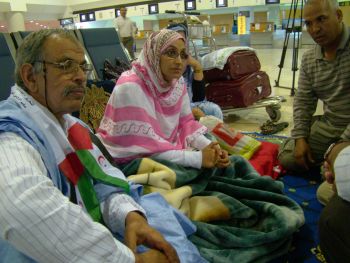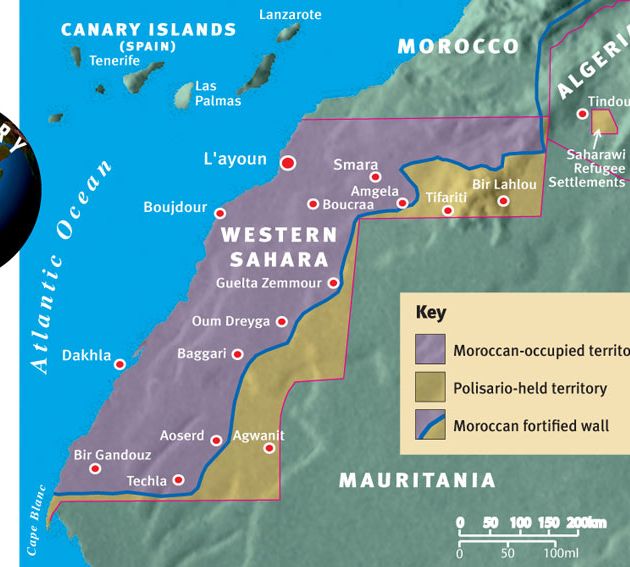Madrid – With her traditional headscarf and eyeglasses, Aminatou Haidar, 42, looks like an ordinary Western Saharan mother of two.
But the iron will of the award-winning activist nearly caused a diplomatic crisis between Spain and Morocco as she defied both countries with a 32-day hunger strike.
Haidar was expected to end her hunger strike as she finally returned early Friday from the Spanish island of Lanzarote to Moroccan-controlled Western Sahara.
Haidar’s protest against Morocco’s refusal to allow her to return home had mobilized the United Nations, the United States, France and the European Union in diplomatic attempts to solve the crisis.
home had mobilized the United Nations, the United States, France and the European Union in diplomatic attempts to solve the crisis.
The “Haidar case” could even help to relaunch talks between Morocco and the Western Saharan independence movement Polisario Front, whose views Haidar is close to, analysts said.
Haidar supports the independence of the desert territory which Morocco snatched after the colonial power Spain withdrew from there in 1975.
When Haidar embarked on a plane for the Western Saharan capital Laayoun on Thursday night after a month-long battle of wills against Morocco, hundreds of supporters cheered her at the airport.
International pressure had apparently forced Rabat to allow her to return to Laayoun, where she had been refused entry in mid-November.
“This is a triumph, a victory for … human rights, international justice and the Saharan cause,” Haidar said.
Haidar supporters claimed Morocco had allowed her to return without conditions, but details about the alleged agreement between Spain and Morocco were not clear.
The situation initially began developing at Laayoun airport as Haidar returned via the Canary Islands after receiving a civil courage award in the United States. Morocco barred her e ntry, because she announced her residence as Saharan instead of Moroccan. The authorities seized her passport and deported her to Lanzarote, insisting she could not get a new passport until she admitted to being a Moroccan national.
ntry, because she announced her residence as Saharan instead of Moroccan. The authorities seized her passport and deported her to Lanzarote, insisting she could not get a new passport until she admitted to being a Moroccan national.
Haidar, who has spent years in Moroccan jails, reportedly undergone torture and endured a previous hunger strike, soon showed she was prepared to die for her cause.
Spanish offers to grant her a Spanish passport, Morocco’s intransigeance, the anguish of her children and mother back in Laayoun – nothing was sufficient to make the activist ingest anything more than sugar water while her health deteriorated.
She drew support from numerous Spanish celebrities while Madrid lobbied the United Nations and the United States to become involved in efforts to save her life.
Morocco finally gave in as Haidar was hospitalized for vomiting and stomach pains early Thursday.
Morocco’s claim over Western Sahara is one of the cornerstones of the country’s nationalism, and observers deemed it unlikely that Rabat accepted to give in to Haidar without getting anything in return.
The Spanish government, which will hold the rotating EU presidency in the first half of 2010, on Thursday “reaffirmed its will to deepen cooperation” between the union and Morocco. It was also thought possible that Morocco had sought concessions in an eventual new round of talks with Polisario.
The Haidar case was believed to have contributed to an announcement by the UN Security Council that it would meet over Western Sahara, possibly in the coming week. The UN wants to accelerate the stalled negotiations between Morocco and Polisario which were at war for 16 years until the UN brokered a ceasefire in 1991.
The plan agreed then foresaw a referendum on independence, but Morocco has not carried it out, and is now offering Western Sahara autonomy instead.
The autonomy plan has won growing acceptance from Western powers tired of the long-running conflict, but Polisario continues insisting on the referendum on independence.





